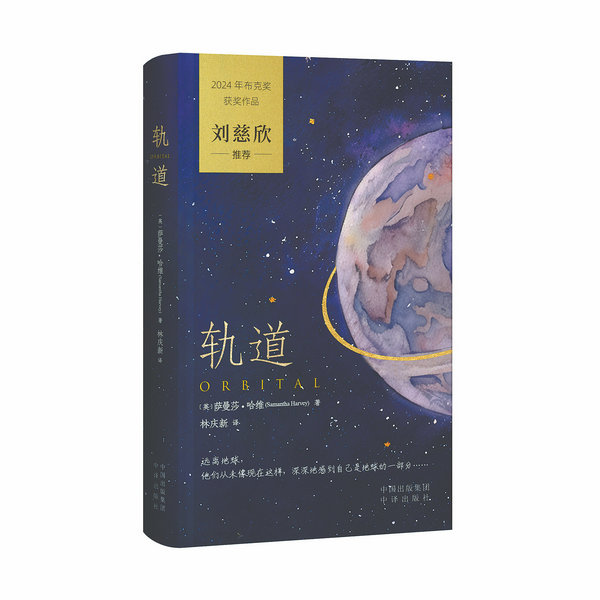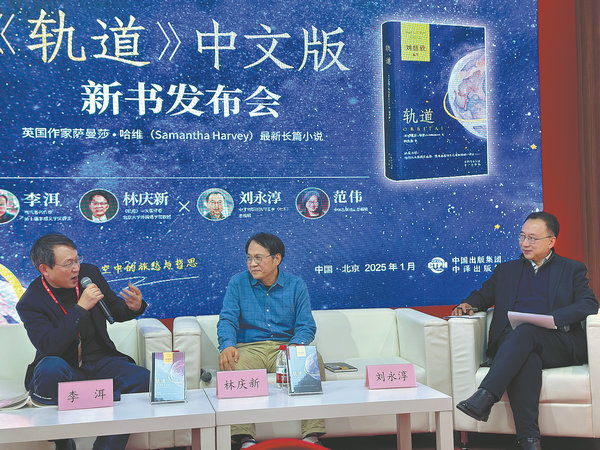

A translation of British writer Samantha Harvey's Orbital was launched by the China Translation and Publishing House at the 37th Beijing Book Fair, which ended on Jan 11.
Winner of the Booker Prize 2024, the prestigious British book award, Orbital is about the observations and reflections of six astronauts aboard the International Space Station. Written in a meditative, poetic voice, it is regarded as a love letter to Earth.
As the space station circles Earth, completing 16 rotations a day, the crew - four men and two women from countries including the United States, the United Kingdom, Italy, Russia, and Japan — experience bereavement, loneliness, mission fatigue, and changes to their bodies.
From outer space, they observe Earth in daylight and darkness, a vision of an interlinked planet where borders are irrelevant to weather events, making the territorial conflicts and politics below appear futile and meaningless.
Lin Qingxin, a professor of English language and literature at Peking University, says that the novel was an aesthetic pleasure to translate.
"The language is that of prose poem, very beautiful. It was not easy to translate. You need to find inner peace before translation. I also spent a lot of time searching online about outer space, science fiction, and theories of post-humanism," he says.
He feels that Harvey's novel follows the tradition of nature writing. What the astronauts observe and feel within the 24-hour period of the story is a kind of observation and meditation on nature.
"The writing style is unique. It blends elements of science fiction, nature writing, and fiction, defying definition," Lin says.
From the vantage of outer space, Earth looks flawless, yet beneath this facade lies myriad human imperfections. Time serves as a reminder of the finite nature of human existence. Through a lens that transcends conventional perspectives, the novel is a profound reflection on society.
"The planet the astronauts observe from outer space is borderless, so they feel disgust and resistance toward geopolitical conflicts," he says.

Writer Li Er regards the novel as unique in the annals of world literature, and says it evoked in him a sense of familiarity and strangeness.
"It discusses timeless human themes, that is, the relationships between individuals, people and the world, humans and Earth, and Earth and the universe," Li says.
Within a 24-hour period, orbiting astronauts see 16 sunrises and 16 sunsets, which affect their bodily rhythms.
"All these changes are something that we, living on Earth, cannot feel," he says.
"The book allows us as readers to imagine, to shift into another dimension of time and space, or even under different circumstances, to stand on another planet, and reconsider the meaning of our lives," he says.
He praises the beauty of the language, the translation, the characters, narrative structure and profound meaning, saying this makes the book a good read for not only adults, but also for primary and middle school students.
Li believes that 2024 marked an important turning point in the history of civilization because of the leap forward created by artificial intelligence, as well as the influence of geopolitics and conflicts around the world.
"During such pivotal moments, scholars, writers, and critics are compelled to scrutinize and contemplate from an alternate dimension, human existence on Earth and its significance," Li says, adding that this is the backdrop against which Orbital has been published.
The six astronauts, from different countries with different backgrounds became a community with a shared destiny as a result of their missions aboard the ISS, he says.
Living aboard the station for an extended period, they find themselves bound by a shared fate despite their differences, as the water they consume has been filtered from their urine, and the air they breathe has passed through each other's lungs.
"The author uses these scenes to represent the idea of sharing the same air and the same fate," he says, "which is something I hadn't thought of before. The integrity of humanity is interpreted in distant space, away from Earth.
"On the space station, the sun and Earth are at the center, yet also at the edge. The dichotomy of center and edge vanishes, along with the borders dividing nations, serving as a critique and satire of ideological conflicts," he continues.
The 16 chapters mirror the 16 orbits the space station completes around Earth during the 24-hour period of the novel. Within its pages, readers are transported, able to witness the grandeur of towering mountains, meandering rivers, vast continents, tumultuous storms, and the intricate genesis of typhoons.
"Viewed from outer space, Earth is a serene creature, so serene that you don't want to control it," says Liu Yongchun, editor-in-chief of the China Translation and Publishing House.
"Only when we look back do we realize who we are and why we, here on Earth, are a community with a shared destiny," he says.